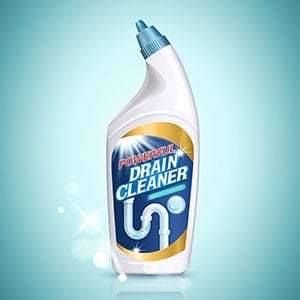Don't Use Just Any Drain Cleaner on Your Drains
September 15, 2018

There are a lot of drain treatment products to choose from – just look down any store aisle that sells these chemicals. That must mean a lot of people use chemical drain cleaners on their drains, right? And that must mean they’re safe to use, right? Wrong.
Admittedly, they do offer a quick and easy “fix” when you have a clog, but before you reach for this bottle, it might be a good idea to know what you’re getting into.
The problem with commercial chemical drain cleaners
PIPE PROBLEMS: If you have older metal pipes and use drain cleaners often enough, it can cause the pipes to degrade. Down the road if you’re having to replace those plumbing pipes because of chemical damage, that $5 bottle of drain cleaner won’t seem like such a bargain.
But you’re not in the clear if you have plastic pipes either. Chemicals in drain cleaners cause chemical reactions, creating heat which can warp and/or melt the pipe, and that can lead to splits and leaks. More pipe replacement, more expense. Not such a great deal.
PEOPLE PROBLEMS: Not only are chemical drain cleaners bad for the pipes, they can be bad for people. They contain powerful substances which can be harmful to health if swallowed or breathed in. They can also cause chemical burns if they come into contact with skin or eyes. It’s important to keep them safely out of the reach of children and/or pets.
By the same token, when these chemicals drain away and make their way through the septic system and/or wastewater treatment facilities, they can become bad for the environment as well. Some of that wastewater can end up in our lakes and rivers, making the potential for damage exponential.
Alternatives to chemical drain cleaners
There’s no doubt these powerful lye-based chemical cleaners are dangerous to handle and use because they’re designed to eat through substances like grease, soap scum, and hair clogs. The interesting thing is, there are other methods which often work better. These include:
Boiling water
Bring water to a boil and then pour it slowly down the drain. Do this two or three times to allow the hot water to work its way through the greasy clog.
Baking soda and vinegar solution
If you mix a third cup of baking soda with a third cup of vinegar, it will make a great fizz. Quickly pour that fizzy stuff down a drain clogged with hair or grime and let it sit for an hour or longer. Then flush with hot water.
Dish detergent
Sometimes a quarter cup of dish detergent can lubricate a clog and help break it up. Follow with hot water and if necessary, a plunger.
Plunger
You may want to reach for the plunger first but reach for the right plunger: cup plungers for sinks and bell plungers for toilets if you want to move that clog.
Bent wire hanger
A regular wire coat hanger can be straightened out to make a surprisingly effective tool for jabbing a clog until it breaks up. Alternatively, a bent hook at the end may help you pull up enough hair and gunk to relieve the clog. Follow with hot water.
Drain snake
A drain snake is a flexible rope-like piece of metal with a spiral at the end. Kind of works like a bent wire hanger.
Sometimes these things will work beautifully, and sometimes you’ll need to call a local plumber. But either way – it’s best to steer clear of the chemical solutions.
